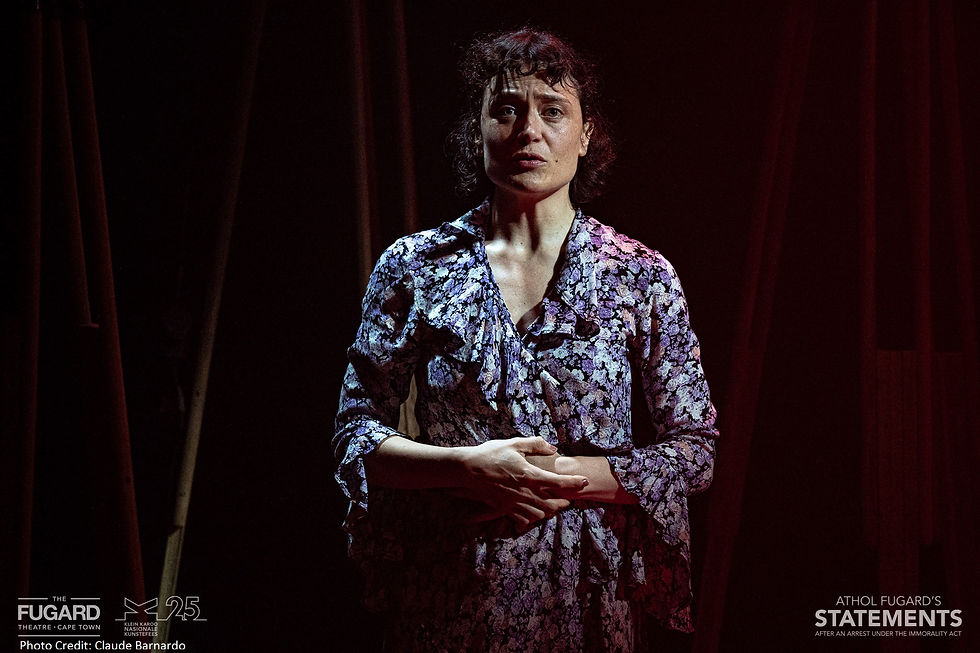Scene It: Riveting and unnerving STATEMENTS at the Fugard
- Beverley Brommert
- Sep 25, 2019
- 2 min read
Any director broaching a production of Athol Fugard’s Statements After an Arrest Under the Immorality Act would be tempted to make the work a period piece, using it as an indictment of apartheid and setting it firmly in the mid-1960s. Not so Greg Karvellas, whose insightful approach elevates this sobering masterpiece to a more universal level, with 20th century South African politics of secondary importance.
The situation in which the abused protagonists find themselves could equally be that of characters in the Orwellian nightmare of 1984, with its leitmotif of “Big brother is watching you”, as there is no privacy for their most intimate exchanges, both physical and emotional.
To make the experience even more immediate for theatregoers, Karvellas has recruited the innovative skills of set designer Wolf Britz and sound designers Charl-Johan Lingenfelder and David Classen to turn the audience into participating voyeurs (like the spying neighbours off-stage, referenced but unseen); the result is both riveting and unnerving.

The Fugard Studio’s petite stage is cleverly transformed from an intimate space into a psychological prison with the lovers Frieda and Errol entwined on a blanket in cramped penumbra, surrounded by surveillance cameras. Above this mini-tableau is the sinister presence of an archaic tape recording machine: there is no place to hide…
References to fear, insecurity, and the ever-present need for circumspection, punctuate the dialogue as it reveals the pair’s contrasting characters and circumstances. He, from the coloured township, is a school principal with aspirations to self-improvement; she, the local librarian, is a middle-class white woman immersed in a life of inveterate dullness – until she falls in love. With him. For both, their furtive coupling has become the only joy in circumscribed lives; yet they are very different. She is prosaic and unimaginative despite her passion, while he has an almost poetic preoccupation with the origins of life, evident in his words, “No vestige of a beginning…” and speculative references to the dawn of creation. At times the couple seem like archetypal male and female, Adam and Eve after the fall and existing in a void.

Unfortunately for them, that void is illusory: it is peopled with malevolent spies whose interference will result in their arrest and forced separation. Yet it is not only the insane ideology served by systematic surveillance which ends their relationship. A deeper division between them stems from the vastly different social milieus they inhabit, and even before the horrendous invasion of their privacy by the police, they quarrel intensely over the availability of water. He cannot accept help from her, while she is hurt and – more significantly – uncomprehending of his mind-set.
With the daunting array of emotions and moods they are required to convey, leads Minnaar and de Kock give the performance of their lives. Physically naked throughout the play, their portrayals have a raw honesty that transfixes the audience, and the natural rhythm of their speech creates the illusion of authenticity in their exchanges. Deft direction from Karvellas does the rest up to the final image of Minnaar, alone and curled in the foetal position under a red glow (blood of the womb or of violence?), the ultimate expression of vulnerability. An electrifying production.
Statements After an Arrest Under the Immorality Act
Director: Greg Karvellas
Cast: Marlo Minnaar and Liezl de Kock
Venue: Fugard Studio
Rating: 5



Comentarios